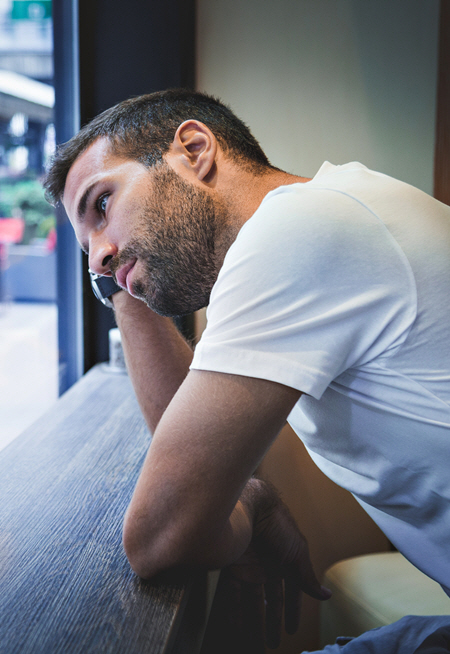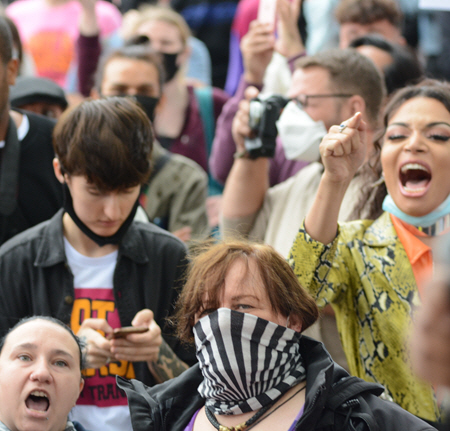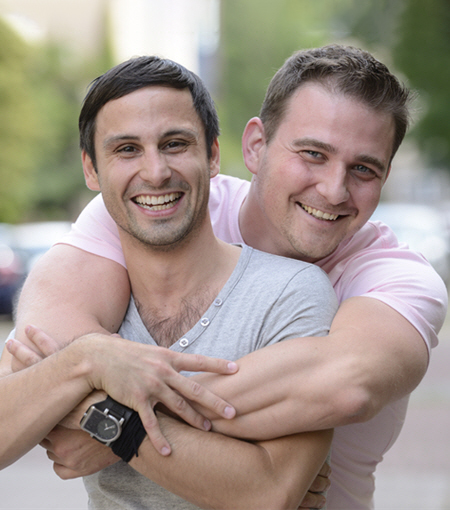 Have you long known that there was something different about you?
Have you long known that there was something different about you?
Maybe you sensed it when you were younger but didn’t know exactly what it was; but, as you got older, you came to understand that it was your sexual orientation.
As you found yourself attracted to others of your same gender, you may have thought, “Well, crap… what now?”
Does this mean that I am gay?
What will my parents think?
Will my friends understand?
Whom can I trust with this?
Will I face discrimination?
Or maybe you began to realize that your physical body wasn’t matching the gender with which you identified internally. Maybe you felt the pull to wear clothing of the opposite sex, but fear kept you from taking the risk. All the while, others related to you as the gendered person that they saw.
“Coming out” versus “staying in the closet”…
Coming out is a process of understanding, accepting, and valuing your gender identity or sexual orientation. Maybe you have come out to most people in your life… or you might be thinking right now about coming out for the first time.
It is often a gradual process, and it usually starts when you “come out to yourself” by first making sense of your feelings about your identity/orientation.
When you are not “out” to others, what do you notice? Maybe you hold back on expressing your opinions or views. Maybe you don’t share personal information. It makes it hard for others to get to know you or feel close to you.
For many, coming out, in general, can be a liberating and freeing process, but there are definitely things that might be holding you back:
Fear of rejection by family members or friends
Disclosing your sexual orientation to a family member or friend does not come without risks.
You may wonder if your parents will still love and accept you. Maybe you would be risking being cut off from financial support that you have depended on. Could they try and change you or convince you that you are wrong?
It’s hard to know for sure how family members will react.
The same goes for your friends. You may be concerned if you come out to them, will they want to continue spending time with you? What types of activities would you still do together socially? Will you drift apart?
 Fear of workplace discrimination
Fear of workplace discrimination
Are you concerned that you may be discriminated against in the workplace? Will you be overlooked for promotions or treated differently by your boss or co-workers?
Maybe you are afraid of being ostracized by the office?
Have you been disappointed by someone’s reaction when you came out to them?
Fear of saying it out loud to someone else
It is possible that you haven’t fully accepted your sexual orientation. You may be living a secret gay life on the side and pretending to the rest of the world that you are straight. When you say, “I am gay” out loud to someone else, it is often the beginning of your commitment to start living as an openly gay person. But are you ready?
Hopefully, whenever you do come out to the people in your life, you will get a big hug and be told that you are still loved. Hopefully, your relationships will become closer since you have taken down your guard and opened up. Remember, coming out is a gift of love as you share your true authentic self with another person.
“It’s hard when you’re always afraid.”
(“A Matter of Trust,” Billy Joel)
Being “out” can have its challenges.
As a bisexual or gay man or woman, you may have struggled or been continuing to struggle with mental health issues specifically related to your sexual orientation.
Do you find yourself “overworking” to prove yourself to the heterosexual world?
Maybe you perceive your sexuality as a deficiency? If so, you may be trying to make up for it by attempting to overachieve in other areas of your life. This can translate into perfectionism, which makes you more critical of yourself, which then hurts your self-esteem and self-image.
Have negative judgments left you feeling anxious in public?
If so, you might be staying closer to home. Even the dating scene can leave you feeling overwhelmed and frustrated, which leads you to remove yourself from it entirely. That isolation may lead to depression and loneliness.
Have you experienced discrimination due to your sexual orientation?
… in the workplace, at family gatherings, with neighbors, or in the general public? It is painful to be treated as different or “less than.” These experiences can cause increased anger, stress, and anxiety.
Were you bullied by family members or peers?
… especially in your teenage years or as a young adult? These experiences can be traumatic and contribute to negative beliefs about yourself. Being exposed to a lifetime of negative messaging in our society about gays and lesbians is also harmful to your self-esteem and self-worth.
Do you feel marginalized by the gay or bi community?
Maybe you have noticed that “messaging” in these communities frequently overvalues male heterosexual qualities like “masculinity”? This can lead other members of this community to feel marginalized through unwanted peer pressure and body dissatisfaction. The result is lower self-esteem and increased stress.
 And if you’re a trans person, you’ll face even more challenges…
And if you’re a trans person, you’ll face even more challenges…
As a trans person, you may have struggled or been continuing to struggle with mental health issues related specifically to your gender identity. These struggles often result in avoiding social encounters, shying away from medical providers, reaching for alcohol and drugs to dampen the anxiety and loneliness, or engaging risky behaviors such as unsafe sex.
Gender Dysphoria
This is the conflict between your biological gender and the gender with which you identify. You will most likely have experienced a great deal of distress living in a body that feels completely wrong and alien to you. It can be extremely uncomfortable and unnatural to dress up and appear in public as a gender that isn’t who you are. You may also have to “play the role” of this public persona. It is painful and confusing, especially for children and adolescents.
Health Care
While you need a great deal of medical knowledge and possible treatment, you may be distressed by negative experiences. The health professionals lack the necessary skills and competencies to care for you safely and competently.
It can be frustrating and exhausting to teach a medical provider about transgender care, and you might even face discrimination due to a provider’s orientation to gender norms.
Employment
The workplace can be especially difficult if you are a trans person. You are in a day-to-day work environment with people you did not choose to be around. Some co-workers may have bias and ignorance about transgendered people, and you can sense their discomfort. Maybe you feel stared at all the time, and the anxiety is getting so bad that you can’t concentrate on your work. There is conflict in the office about what bathroom you should be using. Co-workers may complain that they do not feel comfortable around you, and supervisors start looking for ways to terminate your employment.
It is sometimes easier for gay people to blend into an office than for transgendered people. Some transgendered people develop social anxiety, and it becomes more difficult to leave their house. They may get fired for missing too much time at work. The thought of going to another workplace and going through all of this again is overwhelming, so they avoid employment, which has led to homelessness for some.
 Society
Society
Social issues may have you stressed… such as the highly publicized bathroom debate. Using public bathrooms has become stressful and confusing. Maybe you fear for your safety and avoid public restrooms altogether? Resentment and anger set in.
The misuse of your pronouns can be maddening and a constant reminder of your struggle to be understood and accepted as an out trans person in society.
Are you a trans person who has a more difficult time “passing” in public? The perceived stares and looks that you notice can be overwhelming and trigger feelings of shame and anxiety. Your social anxiety is intensifying over time, and you find it increasingly difficult to leave the house. Loneliness can then set in… and maybe you are turning to drugs and alcohol to cope with the sadness and stigma.
Representation
You want to feel safe and accepted in the LGBTQ+ community, but you experience discrimination and stigma even there. There are some in the gay community who do not want to be associated with the transgender community. They are not comfortable with transgender people due to their own prejudices. Others feel like their association with the trans community negatively impacts their acceptance as gay people in the broader community.
You might also notice that trans people hold few leadership positions in the LGBTQ+ community. Of particular concern is that transgender people of color have even less support and representation, even though they are more likely to be victims of violence and discrimination than white transgender people.
“All I’m asking is for is a little respect.”
(“Respect,” Aretha Franklin)
Wherever you are in your journey… I welcome you.
I know that every LGBTQ+ person is unique; and you have your own stories, struggles, and strengths.
There is nothing more freeing to the soul than to be true to yourself. To be open and honest about who you are and to live your life with meaning and integrity.
You can be confident, walking down the sidewalk, full of love for yourself and for the life you have made around you.
If this is what you dream of for you but need assistance getting there, I can help.
 I understand and can help with your unique treatment needs.
I understand and can help with your unique treatment needs.
Whether you are living openly, closeted, transitioning, or questioning, you will find me to be an affirming therapist familiar with the many different issues you may be facing.
Together, we will explore what help you are seeking. Maybe you are having issues in your same-sex relationship? Are you struggling with online dating and hookups that are leaving you feeling frustrated and lonely? As a transgendered person, is it difficult to negotiate disclosure and safety when dating and meeting new people? Gender queer and pansexual persons can also identify with many of these issues.
In a safe space, I will help you explore issues related to your gender identity and expression. There may be specific issues of self-esteem and social anxiety that we will work on together. Confidence and self-assuredness will help you make the outward changes that are needed.
Are you afraid of coming out in general or to someone specific? I will help you put a support network in place in the event of any negative reactions. We will explore both your legitimate fears and your irrational fears that may be holding you back? And, most importantly, continue to remember “why” you want to come out? Is it the root of any depression or anxiety that you have been suffering?
Is there past or present bullying, discrimination, or homophobia that is negatively affecting you? Together, we can problem-solve to remove the external problem. What effects have these bad experiences had on you? I will help you heal from negative experiences that occurred because of who you are and build the confidence and self-love that can free you from the impact of these experiences.
“And I won’t waste my time fitting in | ‘Cause I don’t think contrast is a sin.”
(“No Cigar,” Millencolin)
Let me help you embrace your true self…
… and guide you through the challenges in life that can come up for LGBTQ+ people.
Contact me today and begin the journey to embrace, love, and accept your true self.
Call, text, or email me and take advantage of a 15-minute free consultation to discuss your needs for therapy and how I can help you: (703) 203-4689.

